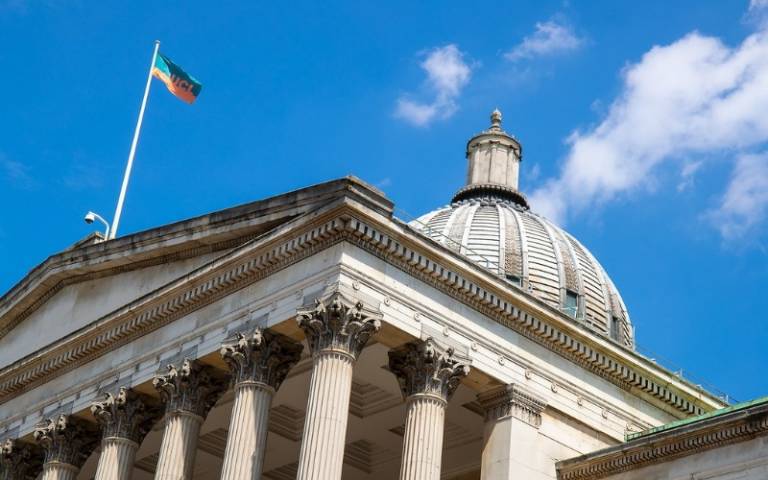Can one iconic UCL building really say so much about who we are?
18 November 2020
PhD student Annamaria Dall’Anese shares how the Introductory Programme prompted her to think about what our academic spaces say about UCL’s past, and how we can shape their future.

You were probably pretty familiar with the Portico of the Wilkins Building before joining UCL. It’s our instantly recognisable logo – but have you ever wondered why? I did! And it made me question what else I didn’t know about the history of the many great architectural and green spaces in Bloomsbury.
I looked to the UCL Introductory Programme (IP) for answers.
The UCL Introductory Programme is designed to help you learn about the university’s past, present, and future, as well as introduce you to some important UCL places and people
Here, I share five things I have learnt and the many more opportunities for discovery it’s sparked along the way.
1. Six architects competed to design UCL’s main building.
Now that UCL has its own school of architecture, The Bartlett, it could maybe draw on its own talent to design our new buildings. But how could staff and students express their ideas, requirements and preferences and who should have the last word on the project? Staff? Students? Our local Camden community?
We can look to the Student Centre as an example – it’s designed by UCL alumnus James Eade and students were widely consulted on its design, hence the great number of group study spaces, drinking fountains and its impeccable sustainability credentials!
2. One of the selection criteria was the size of the library.
Nowadays we can access books and journals from our smartphones, so should we repurpose the libraries that constitute a large proportion of the area available to students at UCL? How would you use these repurposed spaces? The libraries and study spaces are really, really busy right now – it seems we still love them as spaces to think, work and collaborate, so what would we lose by giving them up?
3. Style matters.
A building’s style says a lot about it; it can convey an ideology. Athens, the seat of one of the oldest democracies, was in the minds of UCL’s founders when they selected a Neo-classical style for the Wilkins Building. They felt it a fitting emblem for a global university founded on the principles of democratic reform and egalitarianism.
How could the architecture of different international cities and, in particular, of your own hometown, inform the design of a learning space? What architectural symbol would best represent your new university venture?
4. Names speak.
Gordon Square, a garden much loved by many students, was named after Lady Georgina Gordon, the wife of its designer. If you created a garden for your fellow students, after whom would you name it? Shall we rename places as the people connected to them become more and less famous, or do forgotten names entice us to learn more about the past? Did you know, for example, the Japanese Garden is named after UCL’s earliest students from Japan, the Choshu Five.
5. Buildings trigger feelings.
As well as conveying particular values through their style and decorative symbols, buildings can simply make us feel good, proud, poorly or anything in between. Where at UCL do you feel most creative and productive? How does this feeling influence the image you have of your university?
Discover more
From Jeremy Bentham and an 18th century Scottish Highlander, to “Lady Superintendent” Rosa Morison and the Chōshū Five, the Introductory Programme is full of facts, figures and quizzes about the people and ideas that have guided UCL to the institution it is today. As I’ve discovered, you can engage with new ideas and ways of thinking to help prepare you for your studies, or simply spark debate and discussion.
Share your feedback
If you’ve completed any part of the Introductory Programme, we’d love to hear your feedback. Our survey evaluation is open until 30 November 2020 and takes less than 15 minutes to complete.
 Close
Close

